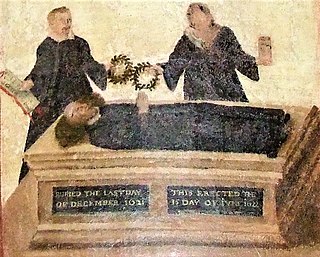
William Byrd was an English composer of late Renaissance music. Considered among the greatest composers of the Renaissance, he had a profound influence on composers both from his native England and those on the continent. He is often coupled with John Dunstaple and Henry Purcell as England's most important early music composers.

The Fitzwilliam Virginal Book is a primary source of keyboard music from the late Elizabethan and early Jacobean periods in England, i.e., the late Renaissance and very early Baroque. It takes its name from Viscount Fitzwilliam who bequeathed this manuscript collection to Cambridge University in 1816. It is now housed in the Fitzwilliam Museum at Cambridge. The word virginals does not necessarily denote any specific instrument and might refer to anything with a keyboard.

Thomas Morley was an English composer, theorist, singer and organist of the Renaissance. He was one of the foremost members of the English Madrigal School. Referring to the strong Italian influence on the English madrigal, The New Grove Dictionary of Music and Musicians states that Morley was "chiefly responsible for grafting the Italian shoot on to the native stock and initiating the curiously brief but brilliant flowering of the madrigal that constitutes one of the most colourful episodes in the history of English music."
The organ repertoire is considered to be the largest and oldest repertory of all musical instruments. Because of the organ's prominence in worship in Western Europe from the Middle Ages on, a significant portion of organ repertoire is sacred in nature. The organ's suitability for improvisation by a single performer is well adapted to this liturgical role and has allowed many blind organists to achieve fame; it also accounts for the relatively late emergence of written compositions for the instrument in the Renaissance. Although instruments are still disallowed in most Eastern churches, organs have found their way into a few synagogues as well as secular venues where organ recitals take place.
John Wilbye was an English madrigal composer.
Giles Farnaby was an English composer and virginalist whose music spans the transition from the Renaissance to the Baroque period.

During the reign of Queen Elizabeth I (1558–1603), English art and high culture reached a pinnacle known as the height of the English Renaissance. Elizabethan music experienced a shift in popularity from sacred to secular music and the rise of instrumental music. Professional musicians were employed by the Church of England, the nobility, and the rising middle-class.
Peter Philips was an eminent English composer, organist, and Catholic priest exiled to Flanders. He was one of the greatest keyboard virtuosos of his time, and transcribed or arranged several Italian motets and madrigals by such composers as Lassus, Palestrina, and Giulio Caccini for his instruments. Some of his keyboard works are found in the Fitzwilliam Virginal Book. Philips also wrote many sacred choral works.
My Ladye Nevells Booke is a music manuscript containing keyboard pieces by the English composer William Byrd, and, together with the Fitzwilliam Virginal Book, one of the most important collections of Renaissance keyboard music.
The Mulliner Book is a historically important musical commonplace book compiled probably between about 1545 and 1570, by Thomas Mulliner, about whom practically nothing is known, except that he figures in 1563 as modulator organorum (organist) of Corpus Christi College, Oxford. He is believed to have previously resided in London, where John Heywood inscribed the title page of the manuscript Sum liber thomas mullineri / iohanne heywoode teste. A later annotation on the same page states that: T. Mulliner was Master of St Pauls school, but this has so far proved unsupportable. The provenance of the MS is unknown before it appears in the library of John Stafford Smith in 1776. After passing through the hands of Edward Francis Rimbault the MS was given to the British Museum in 1877 by William Hayman Cummings.
The English Virginalist School usually refers to the English keyboard composers of the late Tudor and early Jacobean periods. The term virginalist does not appear to have been applied earlier than the 19th century. Although the virginals was among the most popular keyboard instruments of this period, there is no evidence that the composers wrote exclusively for this instrument, and their music is equally suited to the harpsichord, the clavichord or the chamber organ.
The Dublin Virginal Manuscript is an important anthology of keyboard music kept in the library of Trinity College Dublin, where it has been since the 17th century under the present shelf-list TCD Ms D.3.29.

Walsingham was a popular Elizabethan ballad tune. There are various versions of the lyrics, which relate to a pilgrimage site, suppressed during the English Reformation.
"The Carman's Whistle" is a song of the Tudor era. The title refers to the occupation of "carman". Carmen were known for their habit of whistling, which according to William Chappell was effective in the management of horses. Risqué lyrics have survived including a version entitled "The Courteous Carman and the Amorous maid: Or, The Carman's Whistle".
The Huntes upp is a sixteenth century ballad attributed to William Gray.

"Can She Excuse My Wrongs" is a late 16th-century song by the English Renaissance composer John Dowland, the fifth song in his First Booke of Songes or Ayres. The words are set to a dance-tune, a galliard.
"My Robin is to the greenwood gone" or "Bonny Sweet Robin" is an English popular tune from the Renaissance.
Nicholas Strogers was an English composer, active between the years 1560 and 1575. Nothing is known about Strogers' early life and music education. Between Christmas 1564 and 1575, he was a parish clerk at St Dunstan-in-the-West, London, where he was in charge of the music and possibly also played the church organ.

William Inglott or Inglot was an English organist and composer of the Elizabethan era, who is mostly associated with the cathedral in the English city of Norwich.






